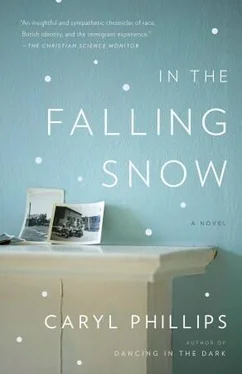‘Of course we can. Now then, you be a good boy and get yourself off to bed.’
Later that night, after all the commotion was over and the policemen had gone, Brenda came upstairs. He tried to block out the noise of her footsteps as she tiptoed closer, but then he heard a squeak as the doorknob to his bedroom began to turn. He instinctively rolled over and faced the wall and pretended to be asleep. Brenda opened the door and then paused. He listened as she took a couple of steps inside the bedroom and then she paused again. He knew that she wanted to say something to him, but he didn’t want to talk to her. Eventually the door closed and he heard Brenda making her way to her own bedroom. In the morning, a sad-looking Brenda dressed him for school and prepared his breakfast, before taking his hand and walking him all the way to the school gates. He remembered that he had nothing to say to her for he remained confused and hurt, but somewhere inside himself he knew that his father had been unkind to Brenda.
He looks through the same window that he used to stare through as a child. After his father came back from the hospital, the West Indian man from whom they used to rent decided to sell his father the house at a cheap price. Apparently, even though five years had passed by, the man was still upset at what Brenda had done to him, and so once his father regained custody it was this house that a thirteen-year-old Keith had to reacquaint himself with. His father is snoring in the room next to him, and it occurs to him that perhaps it was not such a good idea to leave London and come up north. After all, they passed the last hour or so in the pub in almost total silence, which pretty much summed up the nature of their relationship since he left to go to Bristol University as an eighteen-year-old. Nearly thirty years later, his father remains as much a mystery to him as he was back then. He had sat in the pub and watched the older man polish off another two pints of Guinness, but having done so his father looked as though he was going to fall asleep and so he had suggested to him that they leave the pub and make their way back home. During the short walk he tried to make conversation by talking about what they might do tomorrow, but his father seemed irritated by his questions and suggestions and so they re-embraced silence. Once they reached home, he simply followed his father into the cold, empty, house and then wished him goodnight before climbing the stairs to his bedroom.
He waits for his father to finish reading his Daily Mirror , and empty the second pot of tea, before he suggests that rather than watch television they might go out for a walk.
‘Where?’ asks his father, who now looks again at his newspaper.
He stands and begins to collect up the cereal dishes and stack them in the sink.
‘Just to the park.’
‘You want me to go walking in the park with you?’
He decides to do the dishes later, and so he wipes his damp hands on the front of his jeans and looks across at his father, who is now staring back at him over the top of the newspaper.
‘Look Dad, I want to talk to you.’
His father lowers the Daily Mirror , but he doesn’t say anything.
‘I’m not suggesting anything drastic or bad, Dad. I’m just saying that we should talk, okay. Let’s just go for a walk and it’ll give us both a chance to stretch our legs.’
The park is empty, considering what a pleasant day it is, but he also notices that it seems far smaller and scruffier than when Brenda used to bring him. He understands that one’s memory plays tricks, and that the park is exactly the same size, and just as unkempt as it always has been, but he is still disappointed. The pair of them sit side by side on a wooden bench by the small boating pond and he decides to tell his father about the situation with Yvette. He explains that she works for him, and that they started to see each other, and once he broke it off she began to make things both difficult and ugly. He doesn’t stray far from the facts of the story, and he tries not to complicate things by mentioning either Clive Wilson or Lesley.
‘The woman sounds like a bitch.’ His father speaks without turning to look at him. ‘Are you blaming yourself for this situation? Is this why you’re telling me about it?’ He sucks his teeth and doesn’t wait for an answer. ‘Man, women can be treacherous, but I suppose at this stage of your life I don’t have to tell you, right?’
He wants to ask his father about Brenda, and why he still can’t accept that she did what she thought was best for both of them. He also wants to ask his father about the women who seemed to drift in and out of his life during the few years he spent in his father’s house before university. And why, for that matter, does he think it’s all right to call Yvette a ‘bitch’? She isn’t his favourite person, but he wouldn’t call her that name. Across the other side of the pond, a boy is trying to fly a kite, while his somewhat desperate mother attempts to help by pointing in the direction that she thinks the wind is blowing. However, the wind is gusting so she keeps changing her mind, and the boy seems to be getting the string in a tangle. He sneaks an oblique glance and notices that his father is also watching intently, as though this sideshow relieves both of them of the responsibility of continuing their awkward exchange. And then his father slowly turns to face him, and he can see that his eyes are red and damp.
‘Boy, you’re not feeling the cold? You’re like a true Englishman able to sit out here without a hat or scarf and acting like the weather ain’t bothering you at all.’
‘We can go if you like. I just thought it would be nice to have a walk.’
‘Have you finish whatever it is you want to say to me?’
‘I want to talk to you about how you’re living, Dad. I just don’t think that it can go on for much longer. I hate to say it, but I don’t want to get some phone call telling me that they’ve found you passed out in front of the television set, okay?’
‘So this is what you want to talk to me about? I thought you come up here to see me so you can tell me about the girl at work.’
‘To tell you the truth, Dad, I’m not even sure why I came up here to see you. Maybe I did want to tell you about Yvette. I haven’t really had a chance to talk to anybody about it.’
‘And you think that I might be able to give you some advice, is that it?’
‘No, that’s not it. I just needed to get out of London, and I wanted to see you too. But now that I’m here, and I’ve seen how you’re living, I’m worried. Do you want me to pretend that I’m not?’
‘You ever have people who tell you that maybe you should mind your own business? Well?’
He looks at his father, whose shrinking frame seems small and inadequate beneath his big, heavy, overcoat.
‘Look, I cold. If you want to keep talking then maybe we can walk and talk. I tell a few of the boys that I will see them down at the centre.’ His father gets to his feet. ‘You want to come with me?’
The Nelson Mandela Community Centre is essentially an old people’s home, although nobody calls it this. Above the dayroom, with its television, its CD player, and its neatly stacked puzzle books, dominoes, packs of cards and unused board games, are twenty-four one-bedroom flatlets from which the residents occasionally appear if they feel like being sociable. The management is sensitive to outsiders, but they don’t mind one or two people coming in during the period between lunchtime and six o’clock in the evening, which is when dinner is served. His father is clearly a regular visitor, for he appears to be on a first-name basis with the staff and residents alike. ‘You all remember my son, Keith.’ His father sits with his three friends at a Formica-topped table and waits to be dealt into a dominoes game with Ronnie, Baron and Boysey. The three men barely look up from their dominoes as they nod and mutter greetings in his direction. His father claims to have known these men since arriving in England nearly fifty years ago, and it amuses him to see them now, at this juncture of their lives, still finding the energy to revel with what he imagines to be the spirit of their Caribbean youth.
Читать дальше









![Unknown - [Carly Phillips] The Bachelor (The Chandler Brothe(Bookos.org) (1)](/books/174132/unknown-carly-phillips-the-bachelor-the-chandle-thumb.webp)


